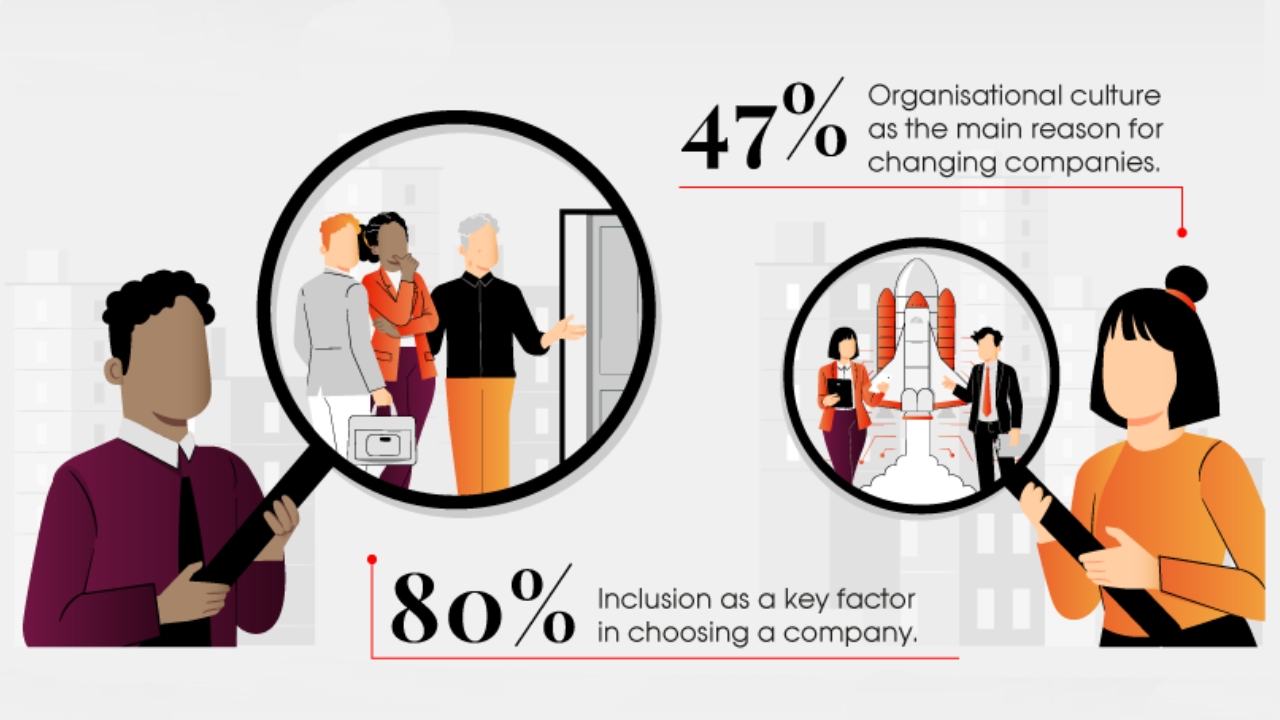We know that there are certain basic aspects that companies with an inclusive organisational culture share: collaboration, mutual trust, care and so on. But these factors alone are not enough. Research by the Harvard Business Review (HBR) revealed what particularly characterised diverse and inclusive companies: a learning-oriented culture.
What will I read about in this article?
The HBR survey revealed that, of the organisations rated as very or extremely diverse and inclusive, 14% had an organisational culture in which learning was the most prominent cultural style.
As we have seen in previous articles, an inclusive organisation generates a sense of belonging in which all members of a company feel recognised, valued and respected as a person and feel free to be who they are in their work context.
According to experts, learning-oriented cultures provide the flexibility and open-mindedness necessary for people to enjoy the business environment. In addition, the ability to adapt and innovate that characterises a learning culture equips organisations to cope with the unforeseen events and developments of a changing business environment.
How can we define a learning culture? It’s a model that challenges its own methods and ways of doing things continuously. This approach facilitates innovation, continuous improvement and the ability to change.
In turn, it enables professionals to gain the knowledge, skills and experience necessary to give the best of themselves, and to help the organisation grow through their personal and professional development.
La The learning culture continually challenges its own methods and ways of doing things. del aprendizaje desafía sus propios métodos y formas de hacer las cosas continuamente.
According to HBR, on the other side of the coin are organisations that foster a culture of authority, where dominance, security and stability are the pillars. These are companies with low rates of diversity and inclusion.
Developing the right culture can be a slow and difficult process. But organisations that succeed will stand out as equitable, diverse and inclusive in the long run. Here are some keys to help foster a learning-oriented culture:
- Move away from the status quo: Organisations with learning-oriented cultures seek out and value people who bring unique and varied perspectives and experiences.
- Emphasise openness, creativity and exploration: these are essential characteristics to reap the benefits of a diverse workplace and to ensure that a wide range of perspectives and experiences are heard and valued.
- Lead by example: we need leaders who are open to new ideas, criticism and feedback. It’s also crucial to recognise those who think innovatively and take risks. If leaders share how their own perspectives have changed over time, as they’ve been open to learning from others and from their own failures, their team will feel they can follow suit.
- Encourage communication about organisational culture: according to HBR data, in 35% of organisations, people do not often talk about corporate culture. And what’s not mentioned, does it exist? Leaders have the opportunity to encourage discussions about company culture, values, what their team members would change about it, how it makes them feel, etc.
- Design organisational structures and processes that foster a learning-centred culture: for example, recruitment processes can include identifying people who are curious and open to change as a key factor.
According to a survey conducted by Deloitte, 80% said that inclusion is an important factor when choosing where to work. In addition, according to Hays data, 47% of people actively seeking new job opportunities consider company culture to be the main reason.
A culture of learning helps create an inclusive environment that drives the retention of diverse talent. Conversely, in organisations where diverse views and voices are silenced, ignored or neglected, problems with management, recruitment and retention are more common.
Forty-seven percent of people actively seeking new job opportunities see company culture as the main reason.
In addition to laying the foundation for a diverse and inclusive workplace, learning-centred organisations will also be well positioned to innovate and evolve in a fast-changing professional environment.
On the other hand, the HBR research found that respondents who reported working in organisations with high organisational performance tended to characterise them as more learning-oriented, while those working in organisations with lower performance levels had cultures that didn’t place much emphasis on learning.
In other words, what is good for diversity is also good for the company’s performance. Fostering a learning culture moves the organisation and the people within it towards inclusive development that benefits everyone.
